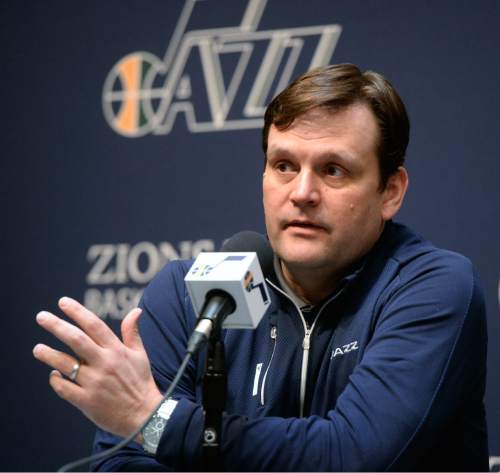This is an archived article that was published on sltrib.com in 2016, and information in the article may be outdated. It is provided only for personal research purposes and may not be reprinted.
Of all the issues facing the Jazz in the offseason, this is the weirdest one: They're too good.
That's a rather unexpected problem for a team that has gone six years without winning a playoff game. Yet the Jazz have encountered difficulty in bringing in potential No. 12 picks in Thursday's NBA draft, because agents want their players to land someplace where they may have more immediate impact, increasing their value for future contracts.
That strategy might make some business sense, but the fundamental basis is funny. A four-time lottery contestant is too loaded with talent? Yeah, that's a good one.
The reality is that even with all of the time and effort the Jazz expend in working out players, they have enough information to draft someone without having him visit. But if you think about it, there's something to be learned from the agents' stance in advance of this draft. Nobody the Jazz can take at No. 12 will make them significantly better right away or probably even become a rotation regular in 2016-17. If the agents know that, the Jazz know that and we all should know that.
So what should the Jazz do? Trade down. Not up, down. If they traded a core player or two to reach any meaningful slot in the draft, that would only decelerate the rebuilding process, and who around here wants to live through any more non-playoff seasons? So if the Jazz go anywhere in this draft order, it has to be down or out.
Any move the Jazz make this summer ultimately should be designed with the the immediate future in mind. The Jazz have to get older, not younger. If they can get a veteran player in a trade that involves the No. 12 pick, they should do it. If they can trade down or even out of the first round, simply forcing themselves to make other moves that add some skill and experience, they should do it.
Trading is tricky, and not a lot of moves involving veteran players historically have been made the week of the draft. Those deals usually come in July, as free agency unfolds. So even though it's not my ideal scenario, I'm prepared for the Jazz to remain at No. 12 and I do have some workable suggestions to make.
If former University of Utah center Jakob Poeltl falls to No. 12, he would fit nicely as a backup to Rudy Gobert. Otherwise, the Jazz can improve their shooting with Wade Baldwin of Vanderbilt or Timothe Luwawu of France.
This is where the agents' unwitting advice comes into play. The Jazz shouldn't worry about duplication. If Wade Baldwin IV becomes their fourth point guard — not even counting Trey Burke, figuring he'll be gone — that's OK. Baldwin is big enough and versatile enough to play both guard positions, and if he can take playing time away from Raul Neto, that's a good sign. If not, he'll lead the Salt Lake City Stars of the D-League.
This is not about stocking the Stars, though. The Jazz's own roster needs an upgrade to ensure this team not only makes the playoffs, but is competitive on that stage. They need somebody like Richard Jefferson. The irony of that statement involves how Jefferson symbolized everything that was wrong about the Jazz's 2013-14 season, when they went 25-57 with Jefferson as a starting forward, cleverly positioned to make the Jazz look like they were sort of trying to win. Or maybe he was just keeping younger teammates off the floor, stunting their development.
And then Jefferson helped the Cleveland Cavaliers win an NBA championship, along with former Jazz point guard Mo Williams. I'm not saying Jefferson himself could elevate the Jazz, just that a younger, improved version of him is the kind of player they need to boost themselves in the competitive Western Conference.
They're not going to get anybody like that at No. 12, and they would have to sacrifice too much to move into a much higher draft position. So the Jazz have to be willing to do even worse than they're slotted to do this week for the sake of doing something better next month, if it takes that long.
The agents have spoken. Their expression of self-interest is accompanied by a message the Jazz should hear in the proper context. It's true that they're too good to have the No. 12 pick make an impact this coming season, but they also should know they're not good enough to get anywhere without acquiring more talent in other ways.
Twitter: @tribkurt



